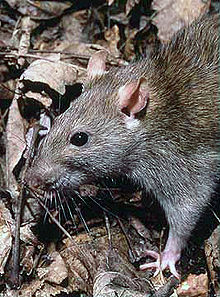 AnAge entry for Rattus norvegicus
AnAge entry for Rattus norvegicus
Classification (HAGRID: 02717)
- Taxonomy
-
Kingdom: Animalia
Phylum: Chordata
Class: Mammalia (Taxon entry)
Order: Rodentia
Family: Muridae
Genus: Rattus
- Species
- Rattus norvegicus
- Common name
- Norway rat
- Synonyms
- Mus caraco, Mus caspius, Mus decumanoides, Mus decumanus, Mus griseipectus, Mus hibernicus, Mus humiliatus, Mus javanus, Mus magnirostris, Mus maniculatus, Mus maurus, Mus ouangthomae, Mus plumbeus, Mus surmolottus, Rattus norvegicus albus, Mus sylvaticus discolor, Mus decumanus hybridus, Rattus humiliatus insolatus, Mus decumanus major, Rattus norvegicus otomoi, Mus norvegicus praestans, Rattus norvegicus primarius, Epimys norvegicus socer, Rattus humiliatus sowerbyi
Lifespan, ageing, and relevant traits
- IMR
- 0.002/year
- MRDT
- 0.3 years
- Maximum longevity
- 3.8 years (captivity)
- Source
- ref. 857
- Sample size
- Large
- Data quality
- Acceptable
- Observations
This common laboratory animal and pet is one of the fastest ageing mammals. In the wild, rats experience a high mortality and rarely live more than 1 year, though in exceptional cases they can live up to 3 years [0851]. Even in captivity, most animals do not normally live more than 3 years. There is some controversy, however, regarding the maximum longevity of this species in captivity. There are reports that rats can live up to 5-6 years [0002], though these have not been verified. A maximum longevity of 4.2 years has also been cited [0001], but this is likely a results of confusion with another rat species (Rattus rattus) [0434]. Arguably the most accurate data comes from one large study with thousands of animals in which maximum longevity was 3.8 years, though one female under caloric restriction lived 4.6 years [0857]. Caloric restriction not only extends lifespan but appears to delay ageing in this species [0707], including demographic ageing [0858].
Like in laboratory mice (Mus musculus), the major cause of death in rats is cancer, though there is variation between strains. Various degenerative conditions have been observed in aged rats, including several kidney diseases [0981].
Life history traits (averages)
- No information is available on life history. Please contact us if you wish to suggest or contribute data.
Metabolism
- Typical body temperature
- 310ºK or 37.1ºC or 98.8ºF
- Basal metabolic rate
- 1.4040 W
- Body mass
- 206.9 g
- Metabolic rate per body mass
- 0.006786 W/g
References
- [0960] Schulke et al. (2012), Living with stress: regulation of antioxidant defense genes in the subterranean, hypoxia-tolerant mole rat, Spalax (PubMed)
- [1103] Lazic (2012), Modeling hippocampal neurogenesis across the lifespan in seven species (PubMed)
- [1136] Gomes et al. (2011), Comparative biology of mammalian telomeres: hypotheses on ancestral states and the roles of telomeres in longevity determination (PubMed)
- [0981] Wolf and Austad (2010), Introduction: Lifespans and Pathologies Present at Death in Laboratory Animals
- [0776] Seluanov et al. (2007), Telomerase activity coevolves with body mass not lifespan (PubMed)
- [0777] Harper et al. (2007), Skin-derived fibroblasts from long-lived species are resistant to some, but not all, lethal stresses and to the mitochondrial inhibitor rotenone (PubMed)
- [0607] Dou et al. (2006), Co-evolutionary analysis of insulin/insulin like growth factor 1 signal pathway in vertebrate species (PubMed)
- [0962] Avivi et al. (2005), Increased blood vessel density provides the mole rat physiological tolerance to its hypoxic subterranean habitat (PubMed)
- [0715] Lorenzini et al. (2005), Cellular replicative capacity correlates primarily with species body mass not longevity (PubMed)
- [0858] de Magalhaes et al. (2005), The influence of genes on the aging process of mice: a statistical assessment of the genetics of aging (PubMed)
- [1067] Refinetti and Piccione (2005), Intra- and inter-individual variability in the circadian rhythm of body temperature of rats, squirrels, dogs, and horses
- [0174] Small et al. (2004), Imaging correlates of brain function in monkeys and rats isolates a hippocampal subregion differentially vulnerable to aging (PubMed)
- [0378] Tollet-Egnell et al. (2004), Growth hormone-mediated alteration of fuel metabolism in the aged rat as determined from transcript profiles (PubMed)
- [0036] Savage et al. (2004), The predominance of quarter-power scaling in biology
- [0610] Ernest (2003), Life history characteristics of placental non-volant mammals
- [0188] Berkovitz and Pacy (2000), Age changes in the cells of the intra-articular disc of the temporomandibular joints of rats and marmosets (PubMed)
- [0001] Carey and Judge (2000), Longevity Records: Life Spans of Mammals, Birds, Amphibians, Reptiles, and Fish
- [0857] Turturro et al. (1999), Growth curves and survival characteristics of the animals used in the Biomarkers of Aging Program (PubMed)
- [0189] Kapahi et al. (1999), Positive correlation between mammalian life span and cellular resistance to stress (PubMed)
- [0434] Ronald Nowak (1999), Walker's Mammals of the World
- [0441] William Burt et al. (1998), A Field Guide to Mammals
- [0915] Lipman et al. (1996), Pathologic characterization of brown Norway, brown Norway x Fischer 344, and Fischer 344 x brown Norway rats with relation to age (PubMed)
- [0455] Virginia Hayssen et al. (1993), Asdell's Patterns of Mammalian Reproduction: A Compendium of Species-Specific Data
- [0119] Yamaguchi and Yamagata (1991), Serotonergic ligand binding in aging brain of experimental animals (PubMed)
- [0002] Caleb Finch (1990), Longevity, Senescence, and the Genome
- [0117] Yamaguchi and Yamaguchi (1987), A new experimental animal for the study of age-related changes in serotonergic neuronal activity in the brain cortex (PubMed)
- [0680] Wootton (1987), The effects of body mass, phylogeny, habitat, and trophic level on mammalian age at first reproduction
- [0511] Ronald Nowak and John Paradiso (1983), Walker's Mammals of the World
- [0707] Yu et al. (1982), Life span study of SPF Fischer 344 male rats fed ad libitum or restricted diets: longevity, growth, lean body mass and disease (PubMed)
- [0436] Cutler (1979), Evolution of human longevity: a critical overview (PubMed)
- [0121] Deyl et al. (1971), Aging of the connective tissue: collagen cross linking in animals of different species and equal age (PubMed)
- [0851] Rat Behavior and Biology
External Resources
- Integrated Taxonomic Information System
- ITIS 180363
- Animal Diversity Web
- ADW account
- Encyclopaedia of Life
- Search EOL
- NCBI Taxonomy
- Taxonomy ID 10116
- Entrez
- Search all databases
- Ageing Literature
- Search Google Scholar or Search PubMed
- Images
- Google Image search
- Internet
- Search Google

